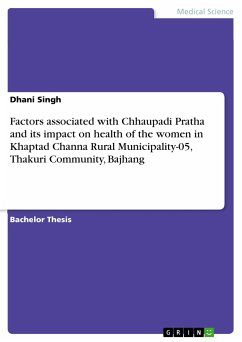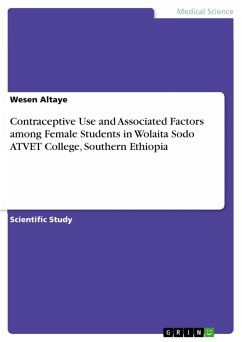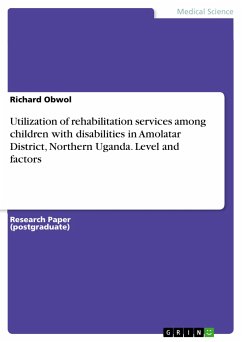
Factors associated with Chhaupadi Pratha and its impact on health of the women in Khaptad Channa Rural Municipality-05, Thakuri Community, Bajhang (eBook, PDF)
Versandkostenfrei!
Sofort per Download lieferbar
Statt: 27,95 €**
18,99 €
inkl. MwSt. und vom Verlag festgesetzt.
**Preis der gedruckten Ausgabe (Broschiertes Buch)
Alle Infos zum eBook verschenkenWeitere Ausgaben:

PAYBACK Punkte
0 °P sammeln!
Bachelor Thesis from the year 2019 in the subject Health - Miscellaneous, , course: Bachelor in Public Health, language: English, abstract: The general objectives of the study were to assess the factor associated with the Chhaupadi Pratha and its impact on health of women of Thakuri community in Khaptad Channa rural municipality-05, Bajhang. The data was collected from 140 reproductive age women's and girls' using a self-administered survey in Khaptad Channa rural municipality-05 Thakuri community Bajhang. The data was collected by using an observation checklist. Descriptive statistics of the ...
Bachelor Thesis from the year 2019 in the subject Health - Miscellaneous, , course: Bachelor in Public Health, language: English, abstract: The general objectives of the study were to assess the factor associated with the Chhaupadi Pratha and its impact on health of women of Thakuri community in Khaptad Channa rural municipality-05, Bajhang. The data was collected from 140 reproductive age women's and girls' using a self-administered survey in Khaptad Channa rural municipality-05 Thakuri community Bajhang. The data was collected by using an observation checklist. Descriptive statistics of the quantitative survey was presented. Chhaupadi system is traditional practice in which women and girls are forbidden to touch anything and have to live in cowshed during menstruation. It is a widespread practice prevalent in Far West and some parts of Mid-West region of Nepal. In Far West it is prevalent mainly in Achham, Bajura, Bajhang, Doti, Baitadi, Dadheldhura, Darchula, Kanchanpur, and Kailali. Chhaupadi is a cultural and religious practice which has roots in the manifestation of the core concept of 'purity' (suddha, Chokho), versus 'pollution' (asuddha, Jutho) which is very prominent in Hindu religion and culture. According to custom, women shouldn't lean milk or ghee while they're menstruating, but should only eat flatbread with salt. This deprives them of nutritious food during their periods. the ladies must survive on a diet of dry foods, salt, and rice. They can't use warm blankets and are allowed only a tiny low rug. they're barred from consuming milk, yogurt, butter, meat, and other nutritious foods. they're also restricted from visiting school or performing their daily functions like taking a shower, forced to remain within the barbaric conditions of the shed. Access to water taps and wells is additionally limited. Chhaupadi women can only bathe or wash clothes during a "chhaupadi dhara"- a separate well, stream or small rivulet nears the village. With such a robust societal stigma attached, the impact of chhaupadi on the health of Nepali women is traumatic to mention the smallest amount five days a month, the ladies are confined to a dark, dirty room without nutritious food in sufficient quantity. As women don't seem to be allowed within the house during menstruation, they often engage in harder, manual labour outdoors as a result, including digging, collecting firewood and grasses and farm labor.
Dieser Download kann aus rechtlichen Gründen nur mit Rechnungsadresse in A, B, BG, CY, CZ, D, DK, EW, E, FIN, F, GR, HR, H, IRL, I, LT, L, LR, M, NL, PL, P, R, S, SLO, SK ausgeliefert werden.













